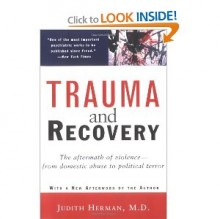 1. Principles of recovery (healing)
1. Principles of recovery (healing)
‘The core experiences of psychological trauma are disempowerment and disconnection from others. Recovery, therefore, is based upon the empowerment of the survivor and the creation of new connections.
Recovery can take place only within the context of relationships; it cannot occur in isolation. In her renewed connection with other people, the survivor re-creates the psychological facilities that were damaged or deformed by the traumatic experience. These faculties include the basic operations of trust, autonomy, initiative, competence, identity, and intimacy.
Just as these capabilities are formed in relationships with other people, they must be reformed in such relationships.
The first principle of recovery is empowerment of the survivor. She must be the author and arbiter of her own recovery. Others may offer advice, support, assistance, affection , and care, but not cure.
Many benevolent and well-intentioned attempts to assist the survivor founder because this basic principle of empowerment is not observed. No intervention that takes power away from the survivor can possibly foster her recovery, no matter how much it appears to be in her immediate best interest.
In the words of one incest survivor, “Good therapists were those who really valued my experience, and helped me to control my behavior rather than trying to control me.”
Caregivers schooled in a medical model of treatment often have difficulty grasping this fundamental principle, and putting it into practice. In exceptional circumstances, where the survivor has totally abdicated responsibility for her own self-care or threatens immediate harm to herself or to others, rapid intervention is required with or without her consent.
But even then, there is no need for unilateral action; the survivor should still be consulted about her wishes and offered as much choice as is compatible with the preservation of safety.’ Judith Herman
2. Stages and tasks of recovery (healing)
In an attempt to simplify a process that is inherently turbulent and complex, Judith Herman proposed that, “Recovery unfolds in three stages. The central task of the first stage is the establishment of safety. The central task of the second stage is remembrance and mourning. The central focus of the third stage is reconnection with ordinary life.”
 Herman goes on to say, “Trauma robs the victim of a sense of power and control; the guiding principle of recovery is to restore power and control. The first task of recovery is to establish the survivor’s safety. This task takes precedence over all others, for no therapeutic workman possibly succeed if safety has not been adequately secured…”
Herman goes on to say, “Trauma robs the victim of a sense of power and control; the guiding principle of recovery is to restore power and control. The first task of recovery is to establish the survivor’s safety. This task takes precedence over all others, for no therapeutic workman possibly succeed if safety has not been adequately secured…”
“In the second stage of recovery, the survivor tells the story of the trauma. She tells it completely, in depth and in detail. This work of reconstruction actually transforms the traumatic memory, so that it can be integrated into the survivor’s life story…”
The principle of empowerment also applies during the second stage of recovery. “The choice to confront the horrors of the past rests with the survivor. The therapist plays the role of witness and ally, in whose presence the survivor can speak of the unspeakable.”
… As the survivor summons her memories, the need to preserve safety must be balanced constantly against the need to face the past. The patient and therapist together must learn to negotiate a safe passage between the twin dangers of constriction and intrusion. Avoiding the traumatic memories less to stagnation in the recovery process, while approaching them too precipitately leads to a fruitless and damaging reliving of the trauma.”
“Traumatic events destroy the sustaining bonds between individual and community. Those who have survived learn that their sense of self, of worth, of humanity, depends upon a feeling of connection to others. The solidarity of a group provides the strongest protection against terror and despair, and the strongest antidote to traumatic experience.
Trauma isolates; the group re-creates a sense of belonging. Trauma shames and stigmatises; the group bears witness and affirms. Trauma degrades the victim; the group exalts her. Trauma dehumanizes the victim; the group restores her humanity.
Repeatedly in the testimony of survivors there comes a moment when a sense of connection is restored by another person’s unaffected display of generosity. Something in herself that the victim believes to be irretrievably destroyed – faith, decency, courage – is reawakened by an example of common altruism. Mirrored in the actions of others, the survivor recognizes and reclaims a lost part of herself.” Judith Herman


